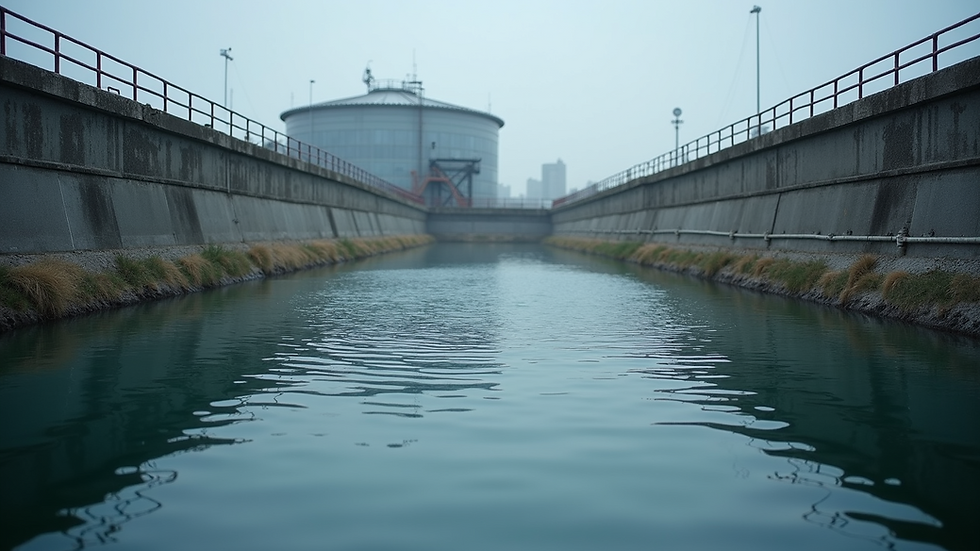How to Optimize Industrial Wastewater Management
- palwinder kaur
- Aug 28, 2025
- 3 min read
Managing wastewater in industrial settings is a critical task that requires careful planning and execution. Efficient wastewater management strategies not only help industries comply with environmental regulations but also reduce operational costs and protect natural resources. This article explores practical ways to optimize industrial wastewater management, offering actionable insights and examples to help industries improve their processes.
Understanding Effective Wastewater Management Strategies
Wastewater management strategies involve a series of processes designed to treat and dispose of wastewater safely. In industrial contexts, these strategies must address the unique contaminants and volumes produced by manufacturing and processing activities. Here are some key strategies to consider:
Source Reduction: Minimizing the generation of wastewater at the source by optimizing production processes.
Segregation of Wastewater Streams: Separating hazardous and non-hazardous wastewater to enable targeted treatment.
Reuse and Recycling: Treating wastewater to a level that allows it to be reused within the facility, reducing freshwater consumption.
Advanced Treatment Technologies: Employing methods such as membrane filtration, biological treatment, and chemical precipitation to remove contaminants effectively.
Regular Monitoring and Maintenance: Ensuring treatment systems operate efficiently through routine checks and timely repairs.
For example, a textile factory can reduce dye-laden wastewater by implementing water-efficient dyeing techniques and recycling treated water for washing processes. This approach not only lowers pollution but also cuts water costs.

What do you mean by industrial waste management?
Industrial waste management refers to the collection, treatment, and disposal of waste generated by industrial activities. This includes solid waste, hazardous waste, and wastewater. Proper management is essential to prevent environmental contamination and health hazards.
Industrial waste management involves several steps:
Waste Identification and Classification: Understanding the types of waste produced.
Waste Minimization: Reducing waste generation through process improvements.
Treatment: Applying physical, chemical, or biological methods to neutralize or reduce waste toxicity.
Disposal: Safely disposing of treated waste in compliance with regulations.
Documentation and Reporting: Keeping records for regulatory compliance and continuous improvement.
For instance, a chemical plant may generate hazardous sludge as a byproduct. Proper treatment and disposal of this sludge are crucial to avoid soil and water contamination.

Key Technologies to Enhance Wastewater Treatment
Adopting the right technologies can significantly improve wastewater treatment efficiency. Some of the most effective technologies include:
Membrane Bioreactors (MBR): Combine biological treatment with membrane filtration to produce high-quality effluent.
Activated Sludge Process: Uses microorganisms to break down organic pollutants.
Chemical Precipitation: Removes heavy metals and other contaminants by converting them into solid particles.
Electrocoagulation: Uses electrical currents to remove suspended solids and contaminants.
Constructed Wetlands: Natural treatment systems that use plants and soil to filter wastewater.
Choosing the appropriate technology depends on the type of wastewater, regulatory requirements, and budget constraints. For example, food processing industries often use activated sludge processes due to the high organic content in their wastewater.

Practical Tips for Optimizing Industrial Wastewater Management
To optimize wastewater management, industries should focus on both operational and strategic improvements:
Conduct Regular Audits: Identify inefficiencies and areas for improvement.
Train Staff: Ensure employees understand wastewater management practices and their importance.
Implement Automation: Use sensors and control systems to monitor treatment processes in real-time.
Invest in Research and Development: Explore innovative treatment methods and sustainable practices.
Collaborate with Experts: Partner with environmental consultants and technology providers.
For example, automating pH and turbidity monitoring can help a paper mill maintain optimal treatment conditions, reducing chemical usage and improving effluent quality.
The Role of Compliance and Sustainability in Wastewater Management
Compliance with environmental regulations is a fundamental aspect of wastewater management. Industries must adhere to discharge limits and reporting requirements set by authorities. Beyond compliance, sustainability is becoming a priority, encouraging industries to adopt practices that conserve water and reduce pollution.
Sustainable wastewater management includes:
Water Conservation: Reducing water use through efficient processes.
Energy Efficiency: Using energy-saving equipment and renewable energy sources.
Pollution Prevention: Minimizing the release of harmful substances.
Resource Recovery: Extracting valuable materials from wastewater, such as nutrients or biogas.
By integrating sustainability into wastewater management, industries can enhance their reputation, reduce costs, and contribute to environmental protection.
Optimizing industrial wastewater management requires a comprehensive approach that combines technology, process improvements, and regulatory compliance. By implementing effective wastewater management strategies, industries can achieve operational efficiency, environmental stewardship, and long-term sustainability.



Comments